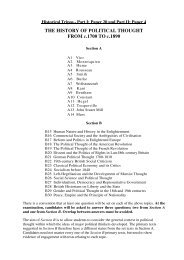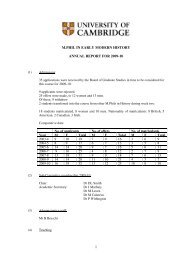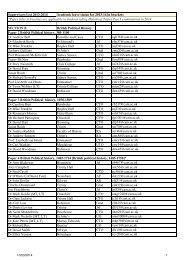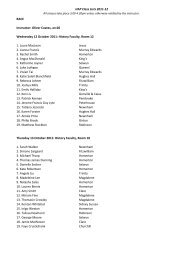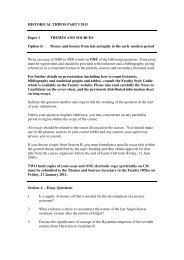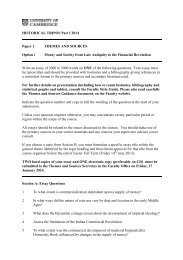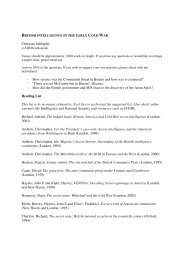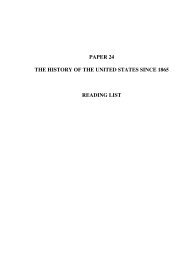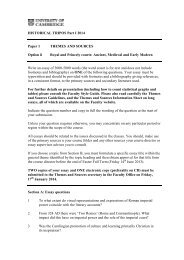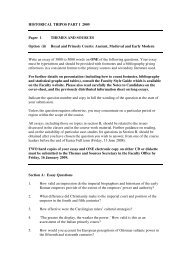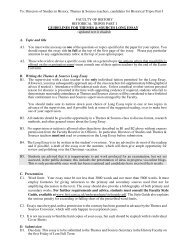Course Handbook - Faculty of History - University of Cambridge
Course Handbook - Faculty of History - University of Cambridge
Course Handbook - Faculty of History - University of Cambridge
You also want an ePaper? Increase the reach of your titles
YUMPU automatically turns print PDFs into web optimized ePapers that Google loves.
Note also:<br />
dates in titles <strong>of</strong> books and articles separated by commas<br />
elision <strong>of</strong> page numbers<br />
‘ed.’ and ‘eds.’ not ‘(ed.)’ and ‘(eds.)’<br />
editors’ names come before and not after a book title, except where the book carries an author’s<br />
name, in the case <strong>of</strong> memoirs, autobiographies, etc.<br />
‘ch.’ not ‘chap.’<br />
a space follows initials <strong>of</strong> names<br />
supply full page ranges for articles in journals<br />
anglicize foreign places <strong>of</strong> publication, e.g. Cologne rather than Kőln.<br />
Where a quotation or particular fact needs referencing, and the work in question is a journal article needing<br />
the full page range at a first citation, then use the following form: Phyllis Deutsch, ‘Moral trespass in<br />
Georgian London’, Historical Journal, 39 (1996), pp. 637-56, at p. 642.<br />
Be especially careful in citing multi-volume works. Avoid ambiguity about whether the date given is the<br />
date <strong>of</strong> a particular volume or <strong>of</strong> the whole series. Use the form: E. S. de Beer, ed., The correspondence <strong>of</strong><br />
John Locke (8 vols., Oxford, 1976-89), V, p. 54. Note that if you were to use the following misleading form,<br />
it would not be clear whether the whole series or just the one volume appeared in the year specified: E. S. de<br />
Beer, ed., The correspondence <strong>of</strong> John Locke (Oxford, 1979), V, p. 54. Multi-volume works occur in so<br />
many different guises - e.g. general editors and volume editors, series titles and individual volume titles -<br />
that it is not possible to prescribe a universal form <strong>of</strong> citation; the priorities should be swift direction <strong>of</strong> the<br />
reader to the correct volume and the avoidance <strong>of</strong> ambiguity.<br />
Even where an historian’s name is given in the text, it should be repeated in the footnote citation. I.e. do not<br />
leave a footnote citation bereft <strong>of</strong> an author.<br />
In a series <strong>of</strong> citations within a single footnote, items should generally be separated by a semi-colon rather<br />
than a point.<br />
For early-modern printed works it is legitimate to omit place <strong>of</strong> publication by providing a covering note at<br />
the beginning, e.g., ‘All pre-1800 works were published in London unless otherwise stated.’ Use ‘n.d.’ (no<br />
date) and ‘n.p.’ (no place <strong>of</strong> publication) where the information is not known. Use signature numbers (‘sig.’)<br />
where pagination is absent.<br />
Internet citations should be avoided wherever possible. The stability <strong>of</strong> e-texts, for example, is not yet<br />
secure; references to e-texts posted on the Internet will become incomprehensible to readers in generations to<br />
come whereas references to printed books will not. Internet citations should only be used where the referent<br />
is a unique resource not available in any other form; in such cases, identify the resource by a project title or<br />
similar as well as by URL in pointed brackets (< >), with the date at which the resource was created (not<br />
accessed) where appropriate.<br />
Second and subsequent references<br />
For example:<br />
Use the author’s surname and short title: not author’s name alone<br />
Use ‘Ibid.’ : see under Latinisms below<br />
Use abbreviations (e.g. for archive repositories) only if the abbreviation has been explained in the<br />
initial reference or in the list <strong>of</strong> abbreviations at the outset <strong>of</strong> the dissertation.<br />
BN n.a.fr. 20628 (Thiers Papers), fo. 279<br />
TNA, Russell papers, 30/22/156, fo. 41.<br />
Morley, Gladstone, II, pp. 147ff.<br />
Cowling, 1867, p. 91.<br />
Ibid., p. 108.<br />
Hynes, ‘Mercantile attitudes’, pp. 971-4; Sacks, Widening gate, p. 19.<br />
33





